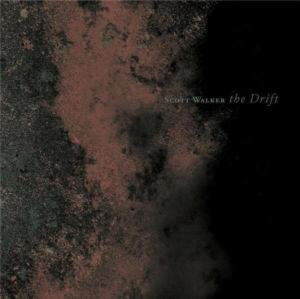
 |
 |
||||||||
| Scott
Walker
I couldn’t imagine the new Scott Walker being anything less than excellent and was thrilled to learn that it exceeded my expectations. If you liked his last official album, 1996’s Tilt (Pola X was a soundtrack), which was even more intense than the one before, 1984’s Climate of Hunter, The Drift is gonna knock you out. If however you aren't already a fan of Scott Walker, I doubt it will do anything to convert you. Before Walker’s increasingly experimental work of the last quarter-century, his fascinating career went from a late 1950s teen rocker phase, to the sophisticated mid-1960s pop of The Walker Brothers, to his classic late 1960s art-song-oriented Scott series, to wanderings in the 1970s that included a couple of forays into country and a Walker Brothers reunion. While his output has been sparse in recent decades, the quality of his work has been unparalleled by others of his generation. I wish that other personal favorites such as Lou Reed or Leonard Cohen or even Dylan could make a new album that I relate to and respect as much as I do The Drift. There are certainly exceptions like Brian Wilson, but Smile was written almost forty years ago and I’ve yet to hear any of his new material that comes close. Scott Walker is truly a rare vintage. The Drift is an avant garde album in the classic modernist sense – belonging more to concert halls, opera houses, and performance spaces than pop venues. Walker hasn’t done his baroque renderings of Jacques Brel for a long time and he ain’t gonna start here. These are long involved pieces that waver from the most bare minimalism to the most elaborate orchestrations. The more spatial parts tend to be the most experimental and ambient – found sounds, found percussion, tape recorders rewinding, synths pulsating, vocal noises, and unorthodox instrumentation. Sometimes the voice is accompanied by nothing or merely a sound. The dense parts tend to possess a sort of post-Wagnerian orchestral atonalism and include almost industrial rhythmic devices. By no means retro, though The Drift is planted firmly in the old modernist opera tradition, there’s plenty to remind people that this is a 21st Century record – from the beats, synths, effect-laden electric guitars, and contemporary editing devices. Walker’s voice retains it’s unmistakable baritone quality and his masterful phrasing is as unusual and breathtaking as ever. Finally this is a true audiophile album and sounds uncommonly gargantuan. Though Walker is often perceived as a great interpreter, many forget that a number of his finest numbers, particularly the ones that came after Scott 3, were penned by the singer himself – both words and music. The lyrical and sonic themes of The Drift are a dark commentary on contemporary culture – both internal and external. While Walker discusses everything from Cossacks to Serbs, from Milosevic to Mussolini, his writing is highly allegorical – never preachy and rarely obvious. The best example is “Jesse,” in which he uses Elvis and his Elvis’ stillborn brother to as a parable for the World Trade Center’s twin towers. The longest epic, the nearly thirteen-minute “Clara,” is all about the growing international climate of fascism. News bites, the sound of bacon frying, inner thoughts, and other random scraps are collected and combined to portray Scott Walker’s personal musical body politic. This could very well be sci-fi or a long and elaborate nightmare - except, knowing what we know as citizens of our time, The Drift yet another bleak contemporary memoir. In its claustrophobia, paranoia, beauty, and supreme power, the apocalypse Scott Walker has titled “The Drift” is unlike anything I’ve ever come across. Who the heck is making art this ambitious, adventurous, and vital these days? As he repeats “I’m the only one left alive” over and over, I begin to believe him. More evidence that there is such thing as an old master in the highy disposable contemporary pop/rock world.
Scott Walker MEDIA: Beggars Group The Drift site with audio and video (doesn't work so well in Firefox - try Explorer) Here's a recent ten-minute interview:
© New York Night Train , 2006
|
 |
||||||||
 |
|||||||||
